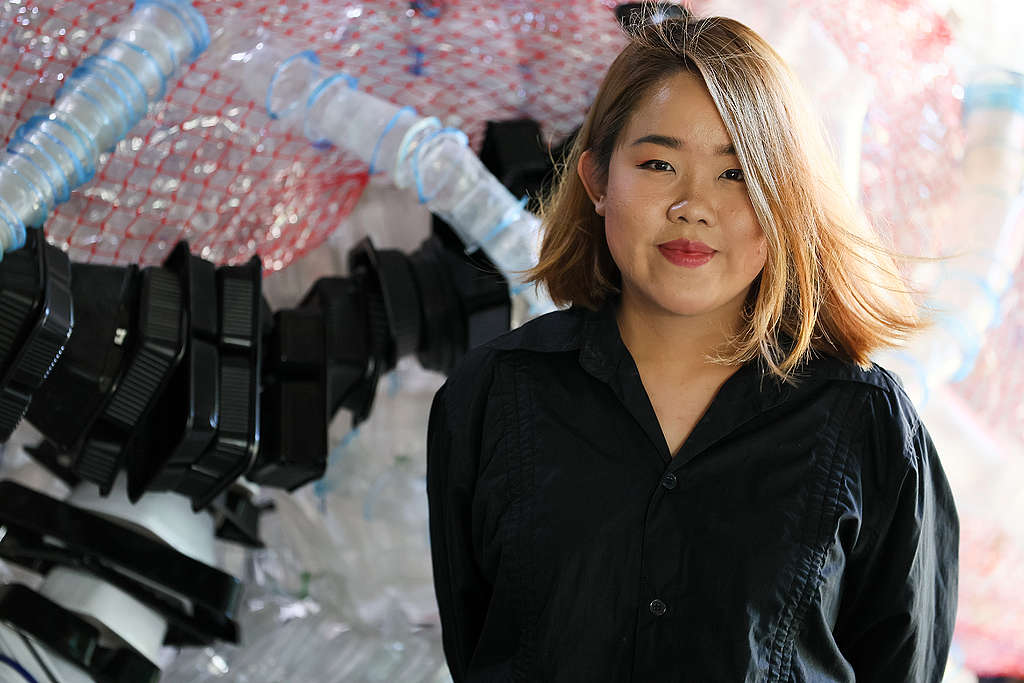“What I am doing is more than putting waste – or what everyone calls “trash”– together. It is not art for the sake of beauty, but art to communicate an environmental problem that must be urgently addressed.”
– Wishulada Panthanuvong, Thai Social Activist /Artist who turns trash into art under the WISHULADA brand

From household wastes to art that disrupts and raises awareness
Growing up, Wishulada Panthanuvong saw her parents sort trash regularly. They would separate and store water bottles into one bag and put plastic bags in another. Her parents did this because they know and realize the value of these materials. It inspired her to use those materials to create pieces of art under the name WISHULADA. The value of her art is not only beautiful but also impactful in a way that makes people consider environmental problems happening around them.
With their household trash, she decided to put her heart and soul into doing her thesis on wastes while at university. WISHULADA started to research more about the origins of various materials until she finally realised that plastic wastes, such as fabric scraps, glue, and water bottles, are linked to massive waste pollution.
It has been nine years since she started creating art to teach society to care about the environment. More than 200 pieces of art made by WISHULADA have been on display and exhibited all over Thailand, such as the BANGKOK EDGE Festival 2020 and the Chula Sustainability Fest 2022.
From sorting plastic wastes to digging dirt on ‘recycling’

Most of the wastes used in her art are from single-use plastic. More than admiring her artworks, WISHULADA wants people to realize and question how plastic figures in all of this- should we continue using disposables without any regard to how plastic wastes will be managed after, or whether recycling can be an option? If so, why do we still have plastic pollution?
If we look at the root cause of the plastics crisis, we were made to believe that plastic can be recycled so we continue using plastic without being concerned about the repercussions and how we’re continuously contributing to more plastic pollution. The fact is, to solve the plastics crisis, we need to reduce, reuse, even refuse single-use plastic. But WISHULADA also believes that nothing’s better than asking plastic producers, like consumer brands, to reduce their use of plastic.
Another interesting thing about the WISHULADA brand is the concept of making art from wastes collected by people who are interested in solving plastic pollution. So there is art co-creation enabling everyone be a part of this movement.
“I have been told many times that If there is no plastic waste then I don’t have any materials to do my work, but I think that’s a great problem to have. The reason that I’m still working on this is because I want to highlight plastic’s environmental impacts. It’s very urgent and everyone should be involved and come together to fix these problems. There’s only one earth and the future generations have to live on it. If we don’t start today, it would be too late. We have to do it together, me, you, the manufacturers, and the government to make our environment better,” WISHULADA concludes.
The Wire Puller: Highlighting brands’ and companies’ roles in the plastics crisis

The Wire Puller is an installation art that WISHULADA created for Greenpeace’s Thailand’s Reuse Revolution event in 2022. The art is made from trash collected from plastic brand audit activities all over Thailand, as well as wastes from consumers who participated in household waste audits to see which brands and products they use, including the types of plastic. The Wire Puller was exhibited at Bangkok Art & Culture Centre last October. WISHULADA designed this work to look like a gigantic hand made of plastic waste from well-known brands to reflect how these companies have a hand in the plastics crisis, at the same time, they also play an important role to clean up their mess and solve the problem.
Imagine, even as consumers try their best to manage plastic wastes but big brands and manufacturers continue to use and produce using single-use plastic, and not take any responsibility for their products, we still end up not solving the plastic waste problem at all.
The future is not disposable. Add your name to our petition to ask major consumer brands in Thailand to reduce their production of single-use plastics.
